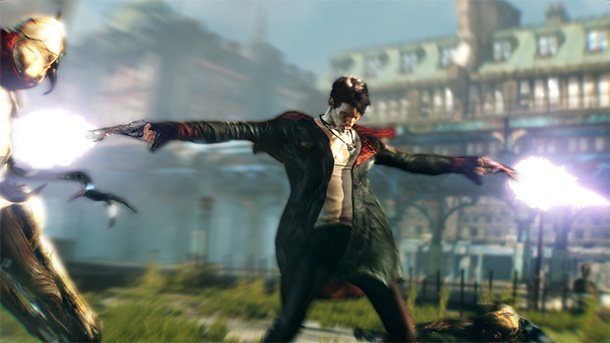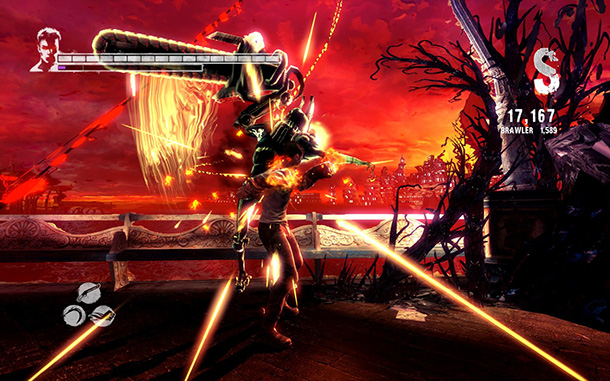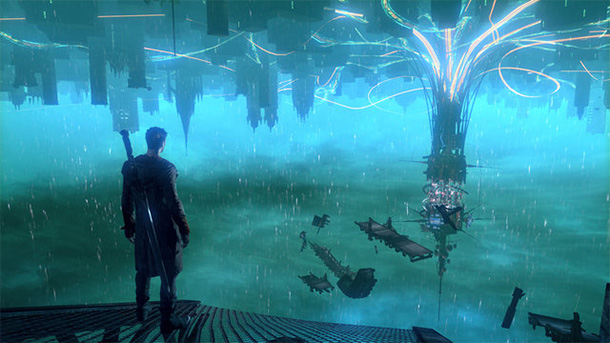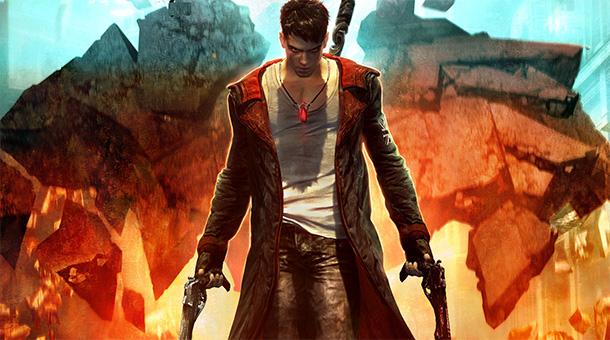Much to the ire of internet warriors everywhere, Ninja Theory (Enslaved, Heavenly Sword), the world’s most divisive developers, were given the task of rebooting the Devil May Cry franchise. Fire rained down from the sky and forum posters spontaneously combusted; it was clearly the end of DMC. It seems Capcom made a wise decision as DmC: Devil May Cry, for lack of a better word, turned out to have potential.

In DmC, the world has been taken over by demonic propaganda. The top news station is run by demons; cameras watch your every move; and the most popular soft drink in the world is actually prepackaged vomit. As the son of Sparda, Dante teams up with an underground organization led by his twin brother, Vergil, and their ever-present psychic friend, Kat, in order to kill the demon that destroyed their lives. That’s pretty much it, which is disappointing that the story isn’t better, especially given Ninja Theory’s previous works (Enslaved, Heavenly Sword), but I’m not sure how much of it is due to Capcom’s inability to craft a plot that makes any semblance of sense. The subtext of media fear mongering, global surveillance, and humanity’s lack of self-control is so banal that it comes off as sophomoric. However, Ninja Theory did do a surprisingly effective job at making the characters more interesting than their old counterparts. Kat, especially, exudes shades of Enslaved’s Trip, making her an extremely likable addition to the cast.
Though the story falters, the combat is mostly solid. You can definitely see some influence from Enslaved, but not enough that it detracts from the DMC feel. At your disposal is an assortment of weapons ranging from Dante’s trusty sword to gigantic hulk-esque fists. Combos are fairly easy to pull off and feel immensely satisfying. The left and right triggers transform Dante’s sword into either an angelic or demonic weapon, respectively, although they do have to be held down which feels incredibly awkward at first. Luckily, you can adjust the button layout in the pause menu, but it’s also not difficult to get used to the control scheme. Using different weapons to combo enemies yields skill points, which Dante can then use to purchase new abilities. Additionally, you can easily redistribute skill points if you don’t use certain weapons or abilities.

Unfortunately for some, this game is absurdly easy. I was able to complete it on every difficulty in little under a week. This is coming from someone who had to play nearly every DMC game on easy because normal difficulty was too punishing. Enemies will literally stand still until you attack them and boss fights, while visually interesting, are nothing more than pushovers. There’s a slight challenge on higher difficulties but it’s only really due to annoying enemy placement, especially when it comes to the introduction of color-coded enemies.
Certain enemies in the game can only be attacked with either your angelic (blue) or demonic (red) weapons. It’s a downright boring and tired battle mechanic that brings the combat to a screeching halt. What angelic weapons lack in raw power they make up for in speed and range, with the opposite holding true for demonic weapons. This leads to red enemies being easily dispatched while blue enemies take what feels like hundreds of hits before they’re finally eliminated. It all feels terribly disjointed, especially since the game actively promotes using a variety of weapons to pull off flashy moves.

Despite the combat’s shortcomings, DmC’s aesthetics and level design absolutely shine for the first 3/4ths of the game. The world literally tears itself apart all around you as the demons try and halt your progress, creating an almost dreamlike effect while you explore Limbo. Even though this effect is used constantly throughout the game, it constantly looked amazing and even added a bit of anxiety, as the floor underneath your feet could up and disappear in any moment. It is really something to behold firsthand. The music is equally fantastic, with tracks lent by Combichrist and Nosia. The club levels, later on in the game, are especially fantastic. I found myself replaying those levels just to listen to the music again. It’s a shame that it couldn’t keep the momentum going for the final levels of the game.
DmC: Devil May Cry is a game of potentials. Everything present doesn’t feel quite finished. Nothing ever felt “just right,” as there was always something hanging on, holding it back from being truly great. But what we’re left with is good, albeit somewhat forgettable game. I guess there’s always the sequel.
This review is based on a retail copy of the game purchased by the reviewer.


No Comments